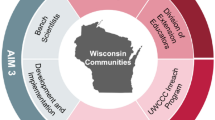Abstract
Volunteers require carefully designed and evaluable training before providing support to newly diagnosed older breast cancer survivors (BCS) after surgery. A training module and 20-h course incorporating discussion, role plays, dyads, and written material were created to supplement core training of senior peer counselors, who provided a telephone support intervention in a randomized controlled trial. Twelve volunteers began the training, ten completed the course, and six of the ten subsequently provided telephone support to 107 BCS. Specialized supplemental training, along with ongoing supervision, effectively prepared volunteers to provide support via telephone to BCS, augmenting professional support.
Similar content being viewed by others
References
Hewitt M, Herdman R, Holland J, National Cancer Policy Board (NCPB) (eds) (2004) Meeting psychosocial needs of women with breast cancer. The National Academies Press, Washington, DC
Center for Mental Health Services, Substance Abuse and Mental Health Services Administration (2005) Mentally healthy aging: a report on overcoming stigma for older Americans. DHHS Pub. No. (SMA) 05–3988
Hayes K, Baginski Y (1992) Bringing home mental healthcare. In-home peer counseling benefits the elderly. Health Prog 73:66–68
U.S. Department of Health and Human Services, Substance Abuse and Mental Health Services Administration, Center for Mental Health Services, National Institutes of Health, National Institute of Mental Health (1999) Mental health: a report of the surgeon general-executive summary
Figueiredo MI, Fries E, Ingram KM (2004) The role of disclosure patterns and unsupportive social interactions in the well-being of breast cancer patients. Psychooncology 13:96–105
Hewitt M, Greenfield S, Stovall E, National Cancer Policy Board (NCPB) (eds) (2006) From cancer patient to cancer survivor—lost in transition. The National Academies Press, Washington, DC
Institute of Medicine (IOM) (2007) Cancer in elderly people. Workshop Proceedings. The National Academies Press, Washington, DC
Arving C, Sjoden PO, Bergh J, Lindstrom AT, Wasteson E, Glimelius B, Brandberg Y (2006) Satisfaction, utilisation and perceived benefit of individual psychosocial support for breast cancer patients—a randomised study of nurse versus psychologist interventions. Patient Educ Couns 62:235–243
Coleman EA, Tulman L, Samarel N, Wilmoth MC, Rickel L, Rickel M, Stewart CB (2005) The effect of telephone social support and education on adaptation to breast cancer during the year following diagnosis. Oncol Nurs Forum 32:822–829
Kroenke CH, Kubzansky LD, Schernhammer ES, Holmes MD, Kawachi I (2006) Social networks, social support, and survival after breast cancer diagnosis. J Clin Oncol 24:1105–1111
Michael YL, Berkman LF, Colditz GA, Holmes MD, Kawachi I (2002) Social networks and health-related quality of life in breast cancer survivors: a prospective study. J Psychosom Res 52:285–293
de Haes JC, Curran D, Aaronson NK, Fentiman IS (2003) Quality of life in breast cancer patients aged over 70 years, participating in the EORTC 10850 randomised clinical trial. Eur J Cancer 39:945–951
Ganz PA, Guadagnoli E, Landrum MB, Lash TL, Rakowski W, Silliman RA (2003) Breast cancer in older women: quality of life and psychosocial adjustment in the 15 months after diagnosis. J Clin Oncol 21:4027–4033
Institute of Medicine (IOM) (2008) Cancer care for the whole patient: meeting psychosocial health needs. The National Academies Press, Washington, DC
Gotay CC, Moinpour CM, Unger JM et al (2007) Impact of a peer-delivered telephone intervention for women experiencing a breast cancer recurrence. J Clin Oncol 25:2093–2099
Badger T, Segrin C, Meek P, Lopez AM, Bonham E, Sieger A (2005) Telephone interpersonal counseling with women with breast cancer: symptom management and quality of life. Oncol Nurs Forum 32:273–279
Giese-Davis J, Bliss-Isberg C, Carson K et al (2006) The effect of peer counseling on quality of life following diagnosis of breast cancer: an observational study. Psychooncology 15:1014–1022
Rawl SM, Given BA, Given CW et al (2002) Intervention to improve psychological functioning for newly diagnosed patients with cancer. Oncol Nurs Forum 29:967–975
Sandgren AK, McCaul KD, King B, O'Donnell S, Foreman G (2000) Telephone therapy for patients with breast cancer. Oncol Nurs Forum 27:683–688
Macvean ML, White VM, Sanson-Fisher R (2008) One-to-one volunteer support programs for people with cancer: a review of the literature. Patient Education and Counseling 70:10–24
Freeman E, Ross M (eds) (1995) Peer counseling for seniors. Center for Healthy Aging, A trainer's guide
Becker F, Zarit SH (1978) Training older adults as peer counselors. Educational Gerontology 3:241–250
Ross M, Freeman E, Kiger H, Crane-Okada R (2007) Specialized training for senior peer counselors. Telephone Support for the Older Woman with Breast Cancer. Trainers' Manual. WISE & Healthy Aging and the John Wayne Cancer Institute at Saint John's Health Center, Santa Monica, CA
Satir V (1988) The new peoplemaking. Science and Behavior Books, Palo Alto, CA
Epstein RM, Street RL Jr (2007) Patient-centered communication in cancer care: promoting healing and reducing suffering: Bethesda, MD, National Cancer Institute, NIH Publication No. 07-6225
Dale J, Caramlau IO, Lindenmeyer A, Williams SM. Peer support telephone calls for improving health. Cochrane Database Syst Rev 2008:CD006903.
Author information
Authors and Affiliations
Corresponding author
Additional information
Supported by the Avon Foundation (New York, NY)
Rights and permissions
About this article
Cite this article
Crane-Okada, R., Freeman, E., Ross, M. et al. Training Senior Peer Counselors to Provide Telephone Support for Newly Diagnosed Breast Cancer Survivors. J Canc Educ 25, 174–179 (2010). https://doi.org/10.1007/s13187-009-0028-7
Published:
Issue Date:
DOI: https://doi.org/10.1007/s13187-009-0028-7




